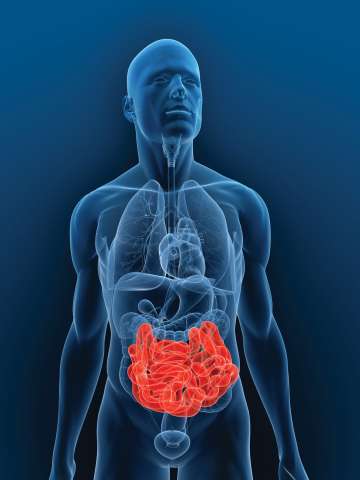Adult Intestinal and Multivisceral Transplant

Why choose UCLA Health for adult intestinal transplant?
As leaders in intestinal transplant (small bowel transplant), UCLA Health delivers effective treatments and well-rounded support from a dedicated team of experts. When you come to us, you’ll find:
Unmatched expertise: Small bowel transplant requires a very specific skill set and expertise. UCLA Health is one of a handful of programs in the U.S. — and among the top programs in the world — to offer this procedure.
Multivisceral transplant experience: Since 1991, we have performed successful multivisceral transplantations (transplant of the intestines, pancreas, liver and stomach) in adults. UCLA Health leads the nation in the latest techniques, and our liver transplant program is one of the most active in the country. Learn more about our Liver Transplant Program.
Outstanding outcomes: Intestinal transplantation at UCLA Health includes state-of-the-art care from world-renowned transplant experts. Our patients have consistently excellent results. Survival rates are equal to or better than those of other leading programs.
Comprehensive gut rehabilitation: We explore every avenue to treat short bowel syndrome (short gut), intestinal failure, and illnesses and injuries that cause intestinal failure. Gut rehabilitation specialists support your health so you can avoid complications that may lead to transplantation.
Highly personalized treatment and expert care: Our years of transplant experience translate into exceptional care. You receive individualized treatment from our experienced intestinal failure care team. We offer support that continues long after your transplant surgery is complete.
Our services
UCLA Health experts offer many nonsurgical and surgical options that may help you avoid the need for a transplant. As part of our comprehensive services, we guide you through every step. We offer:
Nonsurgical care and intestinal rehabilitation
The small intestine absorbs food, liquids and vitamins. If it doesn't work like it should, your body can’t absorb the nutrients it needs, leading to a condition called intestinal failure. Our experts work as a team to deliver well-rounded care for people with this condition.
We specialize in using medications, dietary changes, nontransplant therapy and surgery to help the bowel digest food and absorb nutrients. These treatments enable us to improve gut health. They may even help you avoid a transplant.
Expert transplant services
Should you need a transplant, you can feel comfortable knowing that UCLA Health leads the nation in these procedures. Our specialists have years of experience in intestinal transplantation and multivisceral transplantation.
You receive comprehensive care and support long after you recover from transplant surgery. We’re committed to delivering the full spectrum of follow-up care. This includes help with anti-rejection medications and advice regarding diet and nutrition. Through regular visits, we work with you to improve your overall health, prevent infection and avoid complications.
What causes intestinal failure?
Several conditions, disorders and injuries can cause intestinal failure. These include:
Short bowel syndrome (short gut syndrome): The most common reason for intestinal transplant is short bowel syndrome. With this syndrome, part of the intestine is missing due to a congenital (present at birth) condition.
Disease: Intestinal problems sometimes appear shortly after birth. These problems include volvulus (twisted intestine) or an inflammatory condition called necrotizing enterocolitis. Genetic disorders and motility disorders (problems with how food moves through the intestines) can lead to intestinal failure. GI problems such as Crohn’s disease and celiac disease can affect how the intestines absorb nutrients.
Trauma: Several injuries can damage the intestines and affect how they work. These include injuries from seatbelts, gunshot wounds or stab wounds.
Who is eligible for adult intestinal transplant?
People with intestinal failure need total parenteral nutrition (TPN) to receive essential nutrients. TPN is liquid nutrition provided intravenously (through a vein). Patients who do well on TPN are not candidates for intestinal transplantation. We only consider intestinal transplant when the risks from TPN exceed those of transplantation.
To become a candidate for an intestinal transplant, you must have:
- Intestinal failure
- No expectation by your doctors that your remaining intestine will adapt (absorb the fluids and nutrients your body needs)
- One or more life-threatening complications related to TPN, such as:
Central venous catheter (CVC) infections
Liver disease
Loss of CVC sites
Major fluid and electrolyte imbalances
Severe porto-spleno-mesenteric vein thrombosis (clotting)
Tumors of the intestine or mesentery (tissue that holds your intestine in place)
At UCLA Health, our team helps you determine if transplantation is the most appropriate treatment. We take the time to explain your options and answer any questions you may have about the procedure and recovery.
Intestinal failure treatments we offer
Working as a team, we deliver a wide range of nonsurgical and surgical options to treat intestinal failure. We specialize in:
Intestinal rehabilitation
Through intestinal rehab, UCLA Health specialists improve how the small bowel absorbs essential nutrients. Your rehab plan may include medications, a special diet or nontransplant surgery. Or, we may recommend a combination of these treatments.
Intestinal rehab can prevent TPN complications, which include electrolyte imbalances, infections and liver disease. It may also help you avoid the need for a transplant.
Other small bowel therapies we offer
In many cases, treatments other than transplant can resolve severe problems. Even if another medical center has told you that a transplant is your best option, we may be able to deliver effective surgical or nonsurgical treatments. Our team of experts works together to recommend the most appropriate care.
Your options may include:
Central venous access: TPN requires careful maintenance of intravenous (IV) access. Our experts can provide longer-lasting IV access.
Intestinal lengthening: Surgical specialty procedures may eliminate the need for an intestinal transplant. We offer gut-lengthening surgeries, including serial transverse enteroplasty procedure (STEP).
Parenteral nutrition support: Our team offers deep knowledge about parenteral nutrition. We support your dietary needs and help manage your nutrition. We have special expertise in lipid emulsion formulations. Lipids (fats) are vital for maximizing nutrition in people with intestinal failure.
Surgical reconstruction: Our surgeons have years of experience in developing surgical reconstructive techniques to improve how your intestine functions.
Wound and stoma care: You receive specialized wound care and management of stomas (an opening on your skin connected to your intestine). We offer precision surgeries to improve TPN access and waste removal.
Types of intestinal and multivisceral transplants we offer
Some people with intestinal failure also need multivisceral transplant (transplant of multiple organs). UCLA Health is a complete transplant hospital with experts in all types of transplantation.
We offer:
Small bowel transplant: Surgeons remove only the small intestine and replace it with a healthy organ.
Combined intestine and liver transplant: Patients with both intestinal and liver failure need both organs replaced. Our physicians are among the world’s leading liver transplant experts.
Multivisceral transplant: A multivisceral transplant involves the transplantation of the small intestine plus two or more abdominal organs, such as the liver, pancreas or stomach.
Modified multivisceral transplant: Surgeons transplant the stomach, pancreas and intestine.
Meet our team
Our team includes world-renowned transplant surgeons who have extensive experience with intestinal and multivisceral transplants. You also receive care from intestinal rehab specialists and registered dietitians with expertise in gut health and digestive disorders.
Transplant Surgical
Transplant Medical
Contact us
At UCLA Health, you’ll have an experienced team of transplant specialists who deliver coordinated, expert care. Call to connect with us.
Find your care
At UCLA Health, you’ll have an experienced team of transplant specialists who deliver coordinated, expert care. Call to connect with us.


